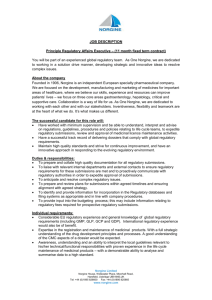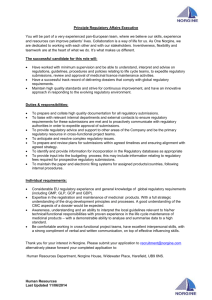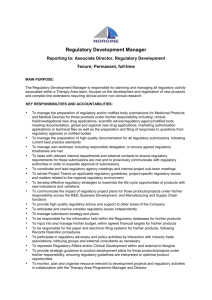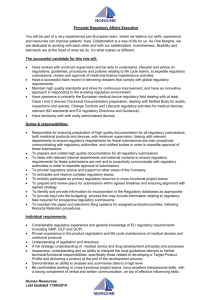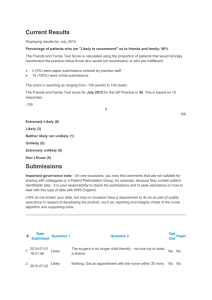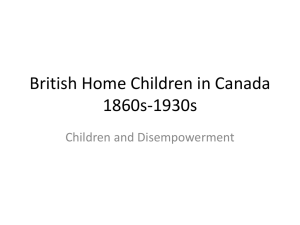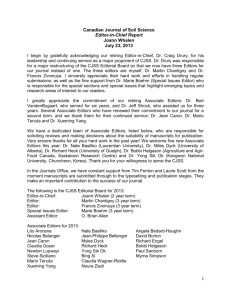The Drug Approval Process in Canada
advertisement
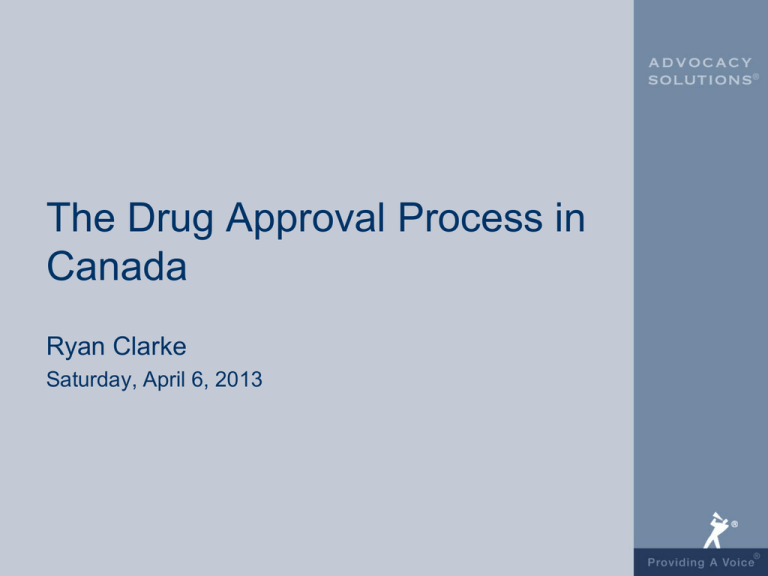
The Drug Approval Process in Canada Ryan Clarke Saturday, April 6, 2013 Overview • Process • Drug approvals • Pricing • Common Drug Review • Listings (ON) Process • Public drug formularies are impacted by federal, provincial and national policies • Manufacturer submits to Health Canada for approval • Common Drug Review (CDR) reviews new drugs (non-oncology) and makes reimbursement recommendations • Provinces also review new drugs and make reimbursement decisions Drug Approvals • Submissions for approval are to the Therapeutic Products Directorate of Health Canada • Reviewed and assessed for safety, efficacy and quality • Issued a Notice of Compliance (NOC) or Notice of Compliance with Conditions (NOCc) Pricing • In Canada, we have regulated prices for patented or brand name drugs • Mission – contribute to Canadian health care by ensuring that prices of patented medicines are not excessive • Also report on price trends of all medicines and R&D conducted by patentees • Annual Report 2011 – Canadian prices were the fourth highest among the seven comparator countries, lower than prices in Switzerland, Germany and the US. Common Drug Review • Review process within The Canadian Agency for Drugs and Technologies in Health (CADTH) • Quebec drug plan does not participate • Recommendations are made by the Canadian Drug Expert Committee (CDEC) based on: – Clinical studies, which assess efficacy and safety – Therapeutic advantages vs. current therapies – Cost effectiveness vs. current therapies Common Drug Review – 2012 • 33 recommendations issued in 2012: – 14 – Do not list – 14 – List with criteria/conditions – 2 – List in a similar manner – 3 – List Common Drug Review – Patient Input • New patient input process in place as of May 13, 2010 • Patient evidence submissions will be accepted from patient groups directly to the CDEC • There had never before been a process to allow this kind of direct engagement between the members of the CDEC and the public • Having said that, the process and guidelines around submissions are very narrow Listings • Provinces and territories have (and will continue to have) the final word on whether a medication is publicly funded • Federal government does the same with their six public formularies (i.e. Non-Insured Health Benefit Program for Canadian First Nations and Inuit people, veterans, Canadian Forces members, designated migrants, RCMP and Correctional Service Canada) • 19 different public formularies, each with their own review and decision-making processes Listings - Ontario • Submissions for listing are made to the Committee to Evaluate Drugs (CED) • 10 physician/pharmacist members, plus 2 patient representatives, appointed by the government • Mandated to make recommendations to the Executive Officer (EO) on which drugs should be reimbursed through the Ontario Public Drug Programs • EO makes the final decision Patient Evidence Submissions Ontario • New patient input process in place as of April 1, 2010 • Patient evidence submissions will be accepted from registered advocacy groups directly to the CED • There had never before been a process to allow this kind of direct engagement between the members of the CED and the public • Having said that, the process and guidelines around submissions are very narrow Advocacy Solutions® Contact Information: Ryan Clarke, LL.B. t. 905.891.0311 f. 905.891.0366 ryan@advocacysolutions.ca www.advocacysolutions.ca
